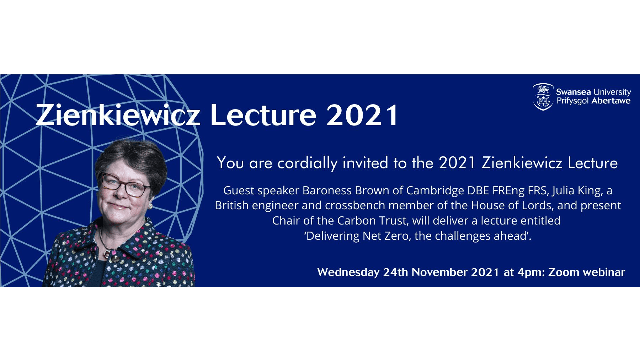Zienkiewicz Lecture 2021
About this event
We are delighted to welcome the Baroness Brown of Cambridge, Julia King, a British engineer and crossbench member of the House of Lords, and present Chair of the Carbon Trust as our guest speaker for the Zienkiewicz Lecture 2021. Baroness Brown's current interests focus on climate change adaptation and mitigation and the low carbon economy.
An academic career at Cambridge University led to Baroness Brown having senior business and engineering roles at Rolls-Royce plc. Returning to academia as Principal of Engineering at Imperial College, she became Vice-Chancellor of Aston University from 2006 - 2016.
The Baroness Brown served as Vice Chair of the Climate Change Committee (CCC) for over 12 years from 2008 – 2021, and she continues to chair its Adaptation Committee; she is Chair of the Carbon Trust; and non-executive director of Orsted. She was formerly a non-executive director of the Green Investment Bank, she led the King Review on decarbonising transport (2008), and was the Prime Minister’s the Low Carbon Business Ambassador for 10 years until 2019. Baroness Brown advises the Government on it’s hydrogen strategy as a member of its Hydrogen Advisory Council.
The Baroness Brown is passionate about education, engineering, innovation and diversity: she was a member of the Browne Review on university funding and Lord Stern’s review of the Research Excellence Framework. She now chairs STEM Learning Ltd., the UK’s leading provider of science teacher continuing professional development, and the Henry Royce Institute, the UK’s national institute for advanced materials.
The Baroness Brown is a Fellow of the Royal Academy of Engineering and of the Royal Society, and was awarded the DBE for services to higher education and technology. In 2015 she was elevated to the Peerage as The Baroness Brown of Cambridge. She is a crossbench Peer, and a member of the House of Lords Science and Technology Select Committee.
The Baroness Brown of Cambridge will deliver a lecture entitled 'Delivering Net Zero: the challenges ahead'.
Abstract:
On 27th June 2019 the UK Government took the historic step of making a legal commitment to delivery 100% greenhouse gas emissions reduction by 2050 – Net Zero.
This was the fastest implementation of a recommendation by the Climate Change Committee since it was created under the Climate Change Act in 2008. But changing the legislation is the easy part. Introducing the policies, regulations, support mechanisms and changes in behaviour that will be needed to deliver the net zero target will be much harder.
In December 2020 the Climate Change Committee published its advice to Government on the 6th Carbon Budget and a path to Net Zero in 2050 compatible with the UK’s commitments under the Paris Agreement. The lecture will cover the rationale for both the level of and the timescale for the target, the calculation of costs and the challenges to delivery in the next 30 years. These include: replacing gas in heating; doubling the size of our electricity system; building a hydrogen industry the size of our current electricity system; changing how we drive; transforming farming; ensuring a ‘just transition’.
The challenge facing us is delivering this scale of change at pace, with the world watching, as we prepare to host COP 26 in Glasgow in November.




